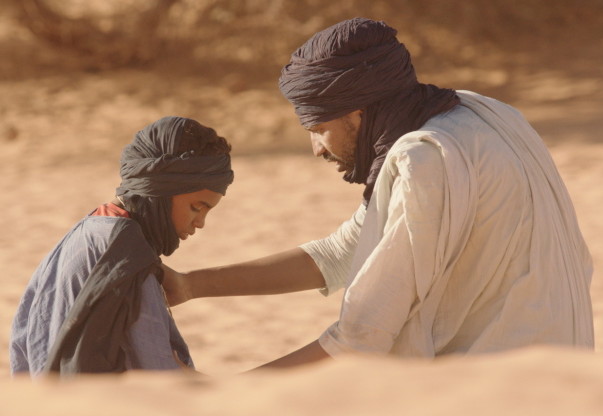“The fringes of their deserts were strewn with broken faiths.”
T.E. Lawrence
The Holocaust did not begin with the slaughter of six million Jews. It began when the first Jewish home in Berlin in 1935 had “Juden” painted on its door.
In director Abderrahmane Sissako’s “Timbuktu” we learn that ISIL did not appear full blown with the beheading of six men in the desert.
It started in small ways, in tiny tent villages in Timbuktu in the Malian desert where the innocent slept, where simple people fish the rivers, herd their few cattle over blowing hot desert sands, like they’ve done for thousands of years.
Here, outside of Timbuktu, whiling away the long, hot days in their tent homes, Kidane (Ibrahim Ahmed) strums his guitar and spends time with his wife Satima (Toulou Kiki) and their 12-year-old daughter Toya (a lovely Layla Walet Mohamed.)
A local boy, Issan, who seems to have no family of his own, is treated by them as a son. Issan spends his days hustling Kidane’s herd of cattle around the dunes like an American child playing with dogs.
Kidane’s tiny village, a collection of tents outside the city walls, is a peaceful oasis, warmed by sun and blessed by quiet moons. It seems like an ancient dream cleared from sand by the winds, an Arabic “Brigadoon,” that left to its own time, would stay the same for another century.
But this century, this decade, has brought to their personal Eden a scorpion of the ancients born anew, the new band of Jihadists, a rag tag off shoot of the dreaded ISIL, led by a humorless Abedelkrim (Abel Jafri) have come to impose their cold Sharia law on the simple villagers.
Fear walks the moonlit streets now, where armed men from away, using a few brainwashed locals, walk the shadows watching and listening.
The uneducated hunters go door to door listening for the sounds of forbidden music.
Almost everything is forbidden in this Orwellian world they’ve brought with them: no smoking, no adultery, no uncovered women’s faces; even their beloved soccer is banned. Some rebel and oppose them. A strong, young woman who sells fish refuses the new law requiring women to wear socks and gloves.
“How can I clean fish wearing gloves?” She is taken away. These militant strangers come from distant parts of the Mideast, and often need local translators to impose their judgements. A kind, moderate local Imam tries to intervene and is ignored. It’s clear that his humane and personal faith is out of date.
Kidane and his family are drawn into the Jihadist web when one of his cows watering in the river, ruins the net of a young fisherman. A tragedy ensues and his life is shattered.
Whippings and stonings become daily events. A man and a woman who were caught playing music together, she without covering, are buried up to their necks and stoned.
In the sandy fields nearby, teenagers and young men play an almost surrealistic game of soccer, kicking an invisible ball and laughing at the absurdity of it all as they play. But they do it so well, that we can almost see the ball they’ve created out of their imaginations.
It has been announced that director/writer Abderrahmane Sissako’s film, written with the aide of screenwriter Kessen Tall, became the first film shot in Mauritania by a Mauritanian director to ever win seven Cesar film awards out of its eight nominations, including Best Film, Best Director, Best Original Screenplay, editing, haunting music, sound and cinematography, (Sofian El Fani may be the Mideast’s Freddie Young (“Lawrence of Arabia”) thus setting the record for being the African film with the most awards ever.
“Timbuktu” is a fresh gift of originality and power. It shows us, once again, how evil, whether in the sands of the deserts, the streets of Europe, or even at the hands of politicians and the police assigned to protect us here in America, can take root under our very noses while we sleep, and grow so big as to block the light of freedom. Are we awake here yet? Are we?
J.P. Devine is a former stage and screen actor.
Copy the Story LinkSend questions/comments to the editors.



Success. Please wait for the page to reload. If the page does not reload within 5 seconds, please refresh the page.
Enter your email and password to access comments.
Hi, to comment on stories you must . This profile is in addition to your subscription and website login.
Already have a commenting profile? .
Invalid username/password.
Please check your email to confirm and complete your registration.
Only subscribers are eligible to post comments. Please subscribe or login first for digital access. Here’s why.
Use the form below to reset your password. When you've submitted your account email, we will send an email with a reset code.